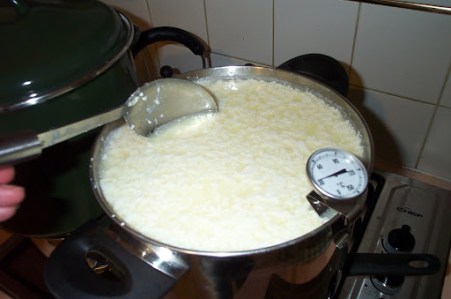Here is a bit of history about Caerphilly from Wikipedia;
Caerphilly cheese is a hard, white cheese that originates in the area around the town of Caerphilly in Wales, although it is now also made in England, particularly in the South West and on the English border with Wales. It was not originally made in Caerphilly, but was sold at the market there, hence taking the town’s name.
Caerphilly is a light-coloured (almost white), crumbly cheese made from cow’s milk, and generally has a fat content of around 48%. It has a mild taste, with its most noticeable feature being a not unpleasant slightly sour tang.
It is rumoured that the cheese was developed over time to provide the coal miners of the area with a convenient way of replenishing the salt lost through hard work over ten-hour shifts underground and so was a staple of the diet of the coal miners.
So here is my method for making it. I used the recipe out of Making Artisan Cheese by Tim Smith and modified it a little.
Caerphilly Cheese
- 7.6 litres whole milk (2 gallons)
- 1/4th teaspoon (about 2 ml) mesophilic culture
- 1/8th teaspoon (about 1 ml) calcium chloride diluted in 60ml cool unchlorinated water
- 5/8th teaspoon (about 3 ml) liquid rennet diluted in 60ml cool unchlorinated water
- 2 tablespoons non-iodized salt
Heat milk to 32°C user double boiler (I use a smaller saucepan under the large pot).

Add the calcium chloride if you are using homogenised milk. Stir for a minute. Then add the starter culture and stir for another minute. Cover and let rest for thirty minutes at target temperature.

Maintaining the temp of 32°C (90°F), add the rennet to the milk, stir for two minutes, then cover. Let mixture sit for forty minutes at the target temperature, or until you get a clean break.

Cut the curds into 6mm (¼ inch) cubes, keeping the size as uniform as possible.

Slowly raise the temp to 33°C (92°F); this should take about ten minutes. Hold the curd at the target temp for forty minutes and be sure to stir frequently to keep the curds from matting. Let rest at target temp for five minutes.

Drain the curds into a cheesecloth lined colander, and let whey drain for a 5 minutes. Cut the curds into 2.5 cm (1 inch) thick slabs, and stack on top of one another. Turn the stack over, top to bottom, two times in ten minutes. This will assist in draining a lot of whey from the curd.

Using your clean hands, break the curds into thumbnail-sized pieces, and blend with salt.

Fill a cheesecloth-lined 1kg cheese mould with the salted curds.

Cover the curd with one corner of the cheese cloth, lay the follower on top, and press at 5kg (10 pounds) for ten minutes.

Remove the cheese from the press, take it out of the mould, and unwrap the cheesecloth. Turn the cheese, and rub a layer of salt on both top and bottom before rewrapping with cheese cloth. Press at 5kg (10 pounds) for ten minutes. Repeat the same procedure (salt), pressing at 7.5 kg (15 pounds) for twenty minutes. Repeat the same procedure, pressing at 7.5 kg (15 pounds) for sixteen hours. I finished this stage at 6 pm on Saturday evening, so I had to wait until 10 am Sunday morning for the next part.

Take the cheese out of the cheese mould, and let it air dry on a cheese mat and cheese board for about 3-4 days. Make sure you turn the cheese several times a day to ensure even drying and fat distribution.

When the cheese is dry to touch, it is ready to be ripened. Place in your cheese cave at 13ºC (55ºF) at 80-85% humidity for three weeks, turning several times a week. No need to wax this cheese. It will form a rind, and if any mould develops, simply rub the cheese with cloth dipped in some brine. The salt in this cheese retards mould growth anyway.

At this time of the year in Australia, you could find a cold cupboard to ripen your cheese in if you don’t have a fridge that you can get warm enough.
This cheese has been profiled on Cheesemaking Help, which is the blog of Ricki Carroll’s New England Cheesemaking Co. I was very pleased when they asked my permission to repost my recipe!
I have been making this cheese every two months for the past two years, and it never fails to please family and friends. Any easy, quick, and tasty cheese to make at home.
